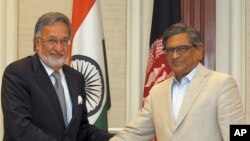The chief diplomats of India and Afghanistan have inaugurated a new council aimed at deepening their strategic ties. India plays a key role in supporting Afghanistan's development and reconstruction, and is also hoping to help support the country's long-term stability.
Foreign Minister S.M. Krishna and his Afghan counterpart, Zalmai Rassoul, co-chaired the inaugural session of the India-Afghanistan Partnership Council in New Delhi Tuesday. It is a first step in implementing a strategic partnership the two countries signed last year.
Krishna says India will soon help Afghanistan mobilize private capital to fund its ongoing reconstruction efforts.
“I have informed Foreign Minister Dr. Rassoul of our intention to hold a meeting of regional investors on Afghanistan in New Delhi," Krishna said.
India already donates billions of dollars to humanitarian causes such as hospitals and education in Afghanistan. Reconstruction efforts have taken on a greater note of urgency with the approach of 2014, when U.S.-led international forces plan to complete a pullout from the country.
Krishna says the strategic fate of India will continue to be tied to that of Afghanistan.
“While it is a time of change and transformation in the region, India's commitment to Afghanistan is neither transitory nor in transition,” he insisted.
Soon after al-Qaida carried out the September 2001 attacks, the United States invaded Afghanistan to capture terror mastermind Osama bin Laden, believed to be sheltered by the country's ruling Taliban.
Afghan Foreign Minister Zalmai Rassoul says India is helping his country's forces prepare themselves to prevent a resurgence of the Taliban after the U.S.-led coalition leaves.
“With India, we are continuing to discuss about training our officers, training national security forces, but also equipping, in the longer term, our security forces,” Rassoul said.
Neither foreign minister made any reference to Indian media reports this week saying the two countries had decided to upgrade intelligence sharing from “routine letters” to a more real-time system. Those reports quoted unnamed officials.
An Indian Foreign Ministry spokesman said Tuesday he knew nothing about such a plan.
India, Afghanistan Boost Strategic Ties




